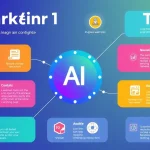Understanding AI Marketing Tools
What Are AI Marketing Tools?
AI marketing tools are innovative software solutions that leverage artificial intelligence to enhance marketing processes and strategies. These tools can analyze vast amounts of data, automate tedious tasks, and provide insights that help businesses target customers more effectively. From chatbots that handle customer inquiries to platforms that optimize advertising campaigns in real-time, AI marketing tools are reshaping the marketing landscape. They enable marketers to focus on creative and strategic elements while automating repetitive tasks and gaining invaluable customer insights.
Why Use AI in Marketing?
The adoption of AI in marketing has exploded in recent years due to its ability to improve efficiency and effectiveness. Businesses use AI to:
- Enhance Decision Making: AI algorithms can process data far quicker than humans, providing marketers with valuable insights that drive strategic decisions.
- Improve Customer Experience: AI tools can analyze customer behavior and preferences to deliver personalized content and recommendations.
- Boost Productivity: Automation of repetitive tasks allows marketing teams to dedicate more time to strategy and creativity, enhancing overall productivity.
As businesses continue to compete in the digital space, those leveraging AI marketing tools are more likely to excel.
Common Features of AI Marketing Tools
While the specifics may vary from tool to tool, many AI marketing platforms share key features that enhance their effectiveness:
- Data Analysis and Reporting: Tools often come integrated with analytics capabilities that highlight trends in customer interactions and campaign performance.
- Customer Segmentation: AI-powered tools can segment audiences based on various criteria, leading to more targeted marketing efforts.
- Content Creation: Some AI tools can generate marketing copy, social media posts, or even videos based on predefined parameters, saving time and effort for marketing teams.
- Automation: Automation features allow for scheduling and executing marketing tasks without the need for manual intervention.
Benefits of Integrating AI Marketing Tools
Enhancing Customer Insights with AI
AI marketing tools afford businesses a deeper understanding of customer behavior. By analyzing historical data and customer interactions, these tools can reveal patterns and predictions about future behaviors. For example, predictive analytics helps businesses identify which customers are likely to convert or churn, allowing targeted outreach strategies that enhance customer retention.
Streamlining Workflows for Better Efficiency
AI tools can significantly improve workflow efficiency. Tasks that previously took hours of manual work can now be executed in minutes or even seconds. By automating repetitive tasks such as email marketing, social media posting, and ad management, businesses can allocate their human resources towards strategic initiatives that drive growth. The result is a more streamlined marketing operation that enhances productivity and service delivery.
Improving Personalization in Marketing Strategies
Today’s consumers expect personalized experiences, and AI marketing tools enable businesses to deliver just that. By analyzing customer data, preferences, and behaviors, these tools can create tailored experiences that resonate with individual users. For instance, e-commerce platforms can recommend products based on previous purchase history, while email campaigns can be personalized based on user interactions. This level of personalization not only increases engagement but also strengthens brand loyalty.
Top AI Marketing Tools in 2025
Overview of Leading Tools
As we look to 2025, several AI marketing tools are making significant waves in the industry:
- HubSpot: The leading CRM platform now includes AI-driven features for predictive lead scoring and personalized marketing.
- Jasper: Known for content generation, Jasper leverages AI to assist marketers in creating effective copy and content strategies.
- Canva: An online design platform that incorporates AI functionalities for quick, custom designs and templates in marketing materials.
- Surfer SEO: This tool utilizes AI algorithms to optimize content for search engines while also suggesting applicable keywords.
Key Features to Look For
When selecting an AI marketing tool, consider the following essential features:
- User-Friendly Interface: A clear, intuitive interface ensures that your team can navigate the tool without extensive training.
- Integration Capabilities: Confirm that the tool can seamlessly integrate with your existing marketing stack to maximize its impact.
- Custom Reporting: Effective AI tools offer customizable reporting features to monitor and assess performance effectively.
- Scalability: Choose a tool that can grow with your business and adapt to increasing complexities and demands of your marketing efforts.
Comparing Costs and Benefits
AI marketing tools vary significantly in cost, from free options to high-end enterprise solutions. When comparing tools, weigh the benefits against the pricing structures. The value these tools can bring—through efficiency gains and improved customer targeting—often justifies the investment. It’s also advisable to explore trial versions before committing to ensure the tool meets your specific business needs.
How to Choose the Right AI Marketing Tool for Your Business
Identifying Your Marketing Needs
The first step in selecting an AI marketing tool is understanding the specific needs of your business. Conduct an internal audit of your marketing processes to identify pain points that could be addressed through automation or data analysis. Are you suffering from slow turnaround times, poor customer engagement, or inefficient resource allocation? By defining your challenges, you can more easily find a tool that provides a solution.
Evaluating Tool Features and Usability
Evaluate potential tools based on their features. Make a checklist of must-have functionalities and compare how each tool measures up. Prioritize those that offer a user-friendly experience and robust support resources. Consideration should also be given to how well the tools fit into your existing workflows and systems, ensuring minimal disruption during implementation.
Considering Integration with Current Systems
Finally, it is essential to choose a tool that integrates well with the systems you already have in place. Seamless integration minimizes disruptions, allows for data flow between platforms, and maximizes the potential ROI from your chosen AI solutions. When evaluating tools, ask for documentation or case studies outlining previous successful integrations.
Future Trends in AI Marketing Tools
Predictions for AI Marketing Innovations
As AI technology continues to advance, we can expect numerous innovations in marketing tools. These include enhancements in machine learning capabilities that allow systems to learn from customer interactions continuously. The integration of AI with augmented reality (AR) and virtual reality (VR) is also emerging, providing immersive experiences for consumers. This could lead to groundbreaking developments in customer engagement strategies that were previously unimaginable.
Preparing for Evolving Customer Expectations
Customer expectations are continuously evolving, driven by experiences powered by AI in other industries. To remain competitive, marketing teams must adapt accordingly. This involves investing in tools that allow for hyper-personalization and customer-centric strategies, responding rapidly to customer inquiries and feedback while also fostering a sense of community around the brand.
Staying Ahead of Competitors with AI
In a landscape where many businesses are adopting AI marketing tools, those who do so effectively will maintain a competitive edge. It’s not just about implementing the technology but also mastering it. Businesses should regularly review performance metrics, solicit customer feedback, and stay informed on industry developments to refine their strategies continually. Those willing to innovate and experiment will position themselves as leaders in their markets.



